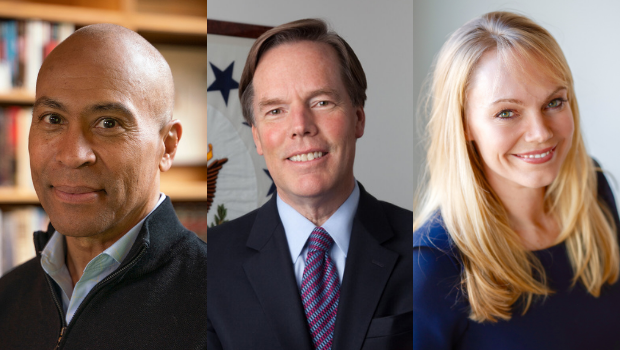The Huffington Post and the Aspen Institute’s Franklin Project produced a series of blog posts from community leaders to recognize the power of national service. The Franklin Project is a policy program working to create a 21st century national service system that challenges all young people to give at least one year of full-time service to their country.
The series is running in conjunction with the National Day of Service and Remembrance on September 11th, and the 20th anniversary of the signing of the AmeriCorps legislation on September 20th. Read below for excerpts of the blog posts, and links to read the full versions of each piece.
 Geoffrey Canada
Geoffrey Canada
President and CEO for Harlem Children’s Zone
Teaching Children How to Make History
As we look ahead to the new school year and think about what’s possible for our children, we should think big. The national debate this year will be around the Common Core Standards, which I support, but just as important is public service. Our children need to understand that we care about their ethical and moral development as well as their academics.
 Mark D. Gearan
Mark D. Gearan
President, Hobart and William Smith Colleges
Beyond the Ivory Tower: Higher Education and The Franklin Project
Fall is a season full of hope and promise on college and university campuses when students arrive to begin a new academic year. They bring with them energy, talent and exuberance for their academic and co-curricular interests, and, increasingly, they bring a deeply held belief in their responsibilities to one another and their communities.
 Audrey Suker
Audrey Suker
Chief Executive Officer, ServeMinnesota
National Service Provides Key to Nation’s Toughest Issues
As AmeriCorps turns 20 and transitions to “adulthood,” it’s exhilarating to witness how its people power, combined with evidence-based practices can, in fact, be a tool to solve unsolved problems.
 Terry Branstad
Terry Branstad
Governor of Iowa
National Service is a “No Brainer”
It is no secret in Iowa that service and volunteerism are near and dear to my heart. Service was a core component of my inaugural address in 1983 and, in my most recent inaugural address in 2011, I highlighted service as part of a new covenant between government and the people we serve. I have long been a believer that our community volunteers, charitable nonprofits, and faith-based institutions are often those best equipped to provide long-term solutions to the challenges we face. Service is an issue that Republicans and Democrats should both wholeheartedly embrace, especially during times of austere budgets.
 Eric Schwarz
Eric Schwarz
Co-Founder and CEO of Citizen Schools and Executive Chairman of US2020
Citizen Power, Multiplied
“I want to be a professional football player in the NFL,” Abdullah said, on the first day of a professional networking class he signed up for at his middle school. Jessica Fick, a former member of AmeriCorps, was facilitating the class with Charlie Bini, an AmeriCorps Teaching Fellow who was serving at the Louise A. Spencer School in Newark, New Jersey. Their goal was to help each student discover a dream and begin mapping a path to achieving it.
 John J. Dilulio Jr. John J. Dilulio Jr.
|
 Joshua Dubois Joshua Dubois |
John J. Dilulio, Jr. is author of “Godly Republic: A Centrist Blueprint for America’s Faith-Based Future” and served as President George W. Bush’s first Director of the White House Office of FaithBased and Community Initiatives
Joshua Dubois is author of “The President’s Devotional” and served as President Barack Obama’s first Director of the White House office of Faith-Based and Neighborhood Partnerships
Have Faith in National Service (Co-Authored by Dilulio Jr. and Dubois)
Each day in America, faith-based organizations, national and local, large and small, perform civic miracles. For instance, cash-strapped urban congregations supply many social services, from day care to health care, from sheltering the homeless to finding jobs for ex-prisoners. Faith communities also power many public-private, religious-secular partnerships that address national needs.
 Eric Greitens
Eric Greitens
Founder and CEO, The Mission Continues
Reporting for Duty. Again.
Five million volunteers. Five million husbands, wives, sons, and daughters. Five million soldiers, sailors, airmen, and Marines who have fought for a dozen years. Next year, the last of these men and women will come home from Afghanistan. What comes next for this generation of veterans? What will their legacy be?
 Angel Taveras
Angel Taveras
Mayor of Providence, RI
The Power of Service
When I graduated from college, I had a great opportunity to return home and dedicate myself to serving the community that had given me so much. I was fortunate to receive an Echoing Green Fellowship, an opportunity that allowed me to launch the Elmwood Youth Enrichment Program, an afterschool and day camp for young children at the Elmwood Community Center in Providence, Rhode Island. I believed then — and continue to believe now — that by expanding access to high quality after-school programming, children from backgrounds similar to mine would have a better chance of succeeding in school, in college and beyond.
 Jason Mangone
Jason Mangone
Director, Franklin Project
What it Means to Serve your Country
Serving my country was an inflection point — it set my life on a new course. As a former Marine, I find myself in a constant pursuit of re-attaining the meaningfulness of those four years, chasing the feeling I had when my profession involved working in challenging conditions with teams of great people to solve big problems whose scope exceeded personal gain. Because I was in the military, I’m allowed to self-identify as having served my country; for thousands of diplomats, intelligence professionals, Peace Corps Volunteers, AmeriCorps VISTA members, firefighters, policemen, and others working to improve communities around the nation, it would be awkward to say “I served my country.” It shouldn’t be.

